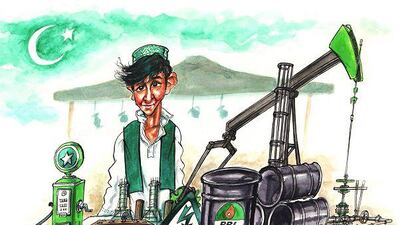DUBAI // Pakistan is waging a war against militancy in an effort to keep pro-Taliban forces at bay. Losing this war would see the country deprived of more than just territory. Troops are not just fighting to save the sovereignty of Pakistan, which is desperately trying to avoid sharing the same fate as neighbouring Afghanistan.
Their efforts in north-western Pakistan are also protecting a fragile economic base that has threatened to collapse several times during the past decade. Growing terrorist attacks and a corresponding rise in the body count among civilians and security personnel alike, coupled with a global economic slowdown, have led to a dramatic decline in foreign direct investments (FDI). This is a clear indication, analysts say, that the security situation in the country needs to improve, and improve really quickly, for foreign investors to once again tread on Pakistani soil.
"Lower levels of confidence and liquidity have combined with concerns about the security situation that is affecting [investment] inflows into Pakistan," says Claudine Fry, a South Asia analyst at Control Risks in London. From July to November last year, Pakistan received US$774 million (Dh2.84 billion) in FDI, a 52 per cent drop compared with a similar period in 2008, says the Board of Investment, a Pakistani body set up to promote foreign investment in the country.
If the financial toll has been severe, the human cost has been greater. The South Asia Terrorism Portal, a terrorism and security analysis organisation in New Delhi, says the total number of people killed in violence in Pakistan nearly doubled from 3,599 in 2007 to 6,715 in 2008. The 2008 toll includes 2,155 civilians, 654 members of the security forces and 3,906 people believed to be terrorists.
There was no respite for civilians or the security forces when the government launched an operation against pro-Taliban groups last year, in which 1,600 people thought to be extremists and 158 soldiers were killed. The number of civilians displaced from Pakistan's Swat region alone during the fighting is close to 300,000. Last year, retaliation from hardliners saw 87 terrorist attacks in North West Frontier Province (NWFP) alone that killed 824 people, including 228 security personnel from various organisations.
In other provinces, suicide bombers have attacked the Pakistani army's headquarters and the offices of the country's premier intelligence agency, Inter-Services Intelligence, crowded markets, mosques, schools and universities. Continuing terrorist attacks will only make attracting foreign investment more difficult. Pakistan's economy has been in a parlous state for the past two years. The government twice had to approach the IMF for loans totalling more than $11bn.
To date it has received only $6.34bn. Pakistan also sought financial help from a group of friendly countries last year and approached the World Bank and the Asian Development Bank to meet its growing balance of payments deficit and to stabilise its fragile foreign currency reserves, largely reliant on foreign aid and borrowings. The country's long-term investment potential is not in dispute, but today the government is struggling to attract foreign investment. Traditionally, whenever Pakistan had faced economic troubles, help had always been at hand from the Gulf region, either in the form of direct aid or via partnerships.
This time is no different as Pakistan has approached investors from the UAE for a quick cash boost in return for the government's stakes in nine of the country's top corporations. Officials from Pakistan's privatisation commission along with JPMorgan Chase, the lead manager on the project, have recently concluded a series of presentations to investment houses including the Abu Dhabi Investment Authority, one the largest sovereign wealth funds in the world, the Emirates Investment Authority and Invest AD.
The government is looking to sell its holdings in firms including the largest lender, National Bank of Pakistan, which has assets of more than $10bn. Also up for grabs are government holdings in the Oil and Gas Development Corp, Pakistan Petroleum, Faisalabad Electric Supply Company, Kot Addu Power, Jamshoro Power, Pakistan Post Office and State Life Insurance Corp of Pakistan, the country's biggest life insurer. The government is also offering its remaining 42 per cent stake in Habib Bank, the largest private commercial bank.
Pakistan's minister for privatisation, Waqar Ahmed Khan, said the government's stake in various corporations could be worth as much as $100bn. "This amount can be raised and used in a variety of ways with the right approach to privatisation process and deal-making," he said. In his optimistic view, the government can sell five of its corporate holdings in the first half of this year. However, data posted on the Board of Investment's website paints a different picture: Pakistan has not recorded a single privatisation deal in the past 18 months.
Ms Fry says all is not as bleak as it appears for Pakistan. Despite serious security problems and political uncertainty, there are still signs of investor appetite for engagement in the country. "There are signs of resilience among investors, particularly those with a long-established presence in the country," she says. However, those who are already in Pakistan are finding it difficult to operate in a politically influenced business environment. One example is the experience of Etisalat, the UAE's largest telecommunications operator, which is in a dispute with the Pakistani government over a 2006 stake it bought in Pakistan Telecommunication for $2.6bn.
Etisalat has withheld payments worth close to $1bn as it seeks a transfer of valuable commercial property that is included in the original share purchase agreement. Political instability, conflicts within state institutions and threats of militancy and economic upheaval have put the country in a precarious situation. Pakistan needs to rise above the challenge. Surviving on foreign aid, which has continued to flow because Pakistan is a front-line state in the war on terrorism, and boosting foreign exchange reserves through borrowing are not the answer.
@Email:skhan@thenational.ae


